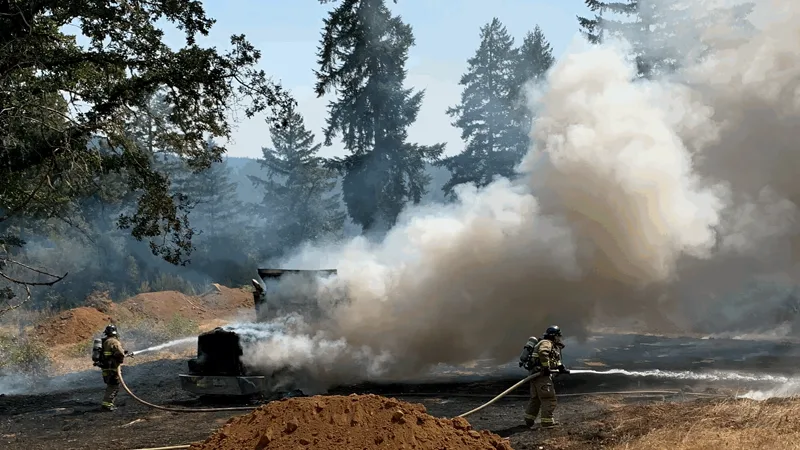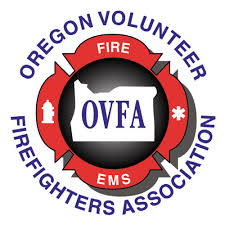Published: February 7, 2024
CINDY WEELDREYER
Sentinel Community Reporter
In 2020, at the end of the Labor Day weekend, years of drought and high winds from the east fueled fast moving wildfires. They raced down Western Oregon’s river valleys and devastated many small communities. The disaster inspired residents in the Row River Valley to form a fire district, which will go before voters in the May 21 election.
The Row River Valley, east of Cottage Grove, has approximately 1,000 residents, two schools and the highest concentration of unprotected homes in Lane County that lack essential fire protection services.
Past attempts to organize a fire protection district were narrowly defeated at the ballot box. The aftermath of the 2020 wildfire devastation increased public awareness of how the climate is changing. It also enhanced feelings of vulnerability and fear from the forest fires of the future.
In February 2022, the community mobilized to establish the Row River Fire Response (RRFR) to address the service gap by creating a fully-functional fire response department. Eight months later it became a 501c3 nonprofit organization.
The 200 strong all-volunteer effort is led by an eight member board of directors and aided by dedicated committee members and supporters. The volunteers have invested a great deal of time and effort to create Ballot Measure 20-350.
The journey has been a collaborative one.
In May 2023, the Board of Directors of South Lane Fire & Rescue (SLFR) endorsed Chief John Wooten’s proposal to create a transitional auxiliary unit in collaboration with RRFR to address emergency requirements in the Row River Valley area.
Within four months of their dedicated support, RRFR volunteers effectively filled the service gap by establishing a fully-operational fire response department. This department comprises professionally trained firefighters, certified by the Oregon Department of Public Safety Standards and Training, who operate out of temporary fire stations in the valley.
After joining SLCFR as an auxiliary battalion, volunteers have actively engaged in firefighting and responding to medical emergencies within the valley and from neighboring fire districts requesting mutual aid. Firefighters enhanced their skills, experience, and knowledge through participation in the fire academy and by acquiring EMT certifications.
RRFR Board members credit Chief John Wooten and SLCFR’s commitment to supporting their organization as well as the diligence and efforts of committed community volunteers for its successes to date.
“The (SLCFR) District’s Board, Staff and I are happy to support the efforts of RRFR and their many supporters to see a fire district formed in the Row River area,” Wooten said. “In my career, I have worked in other areas around the state with unprotected areas and have seen conflagrations develop due to a lack of local organized fire protection services.
RRFR Board Member Kathleen Istudor said organizers are happily surprised by the tremendous support their nonprofit has received to make their dream a reality.
Istudor noted, “In addition to SLCFR’s support, other partners include the Lane County Fire Defense Board and multiple fire districts that donated essential equipment. Lane Electric Cooperative, the Weyerhaeuser Giving Fund, CoBank, the Cow Creek Foundation and the Woodard Family Foundation provided financial support. Elected and appointed officials at Lane County, in the Oregon Legislature, the Oregon State Fire Marshal, and many administrative agencies have assisted us with the application and development processes.”
Not all Row River Valley residents support the upcoming ballot initiative in the May 21 election.
The community is small. Many residents live on a fixed income so the main resistance is increased taxes. If the measure does not pass organizers say all their hard work will be undone, including the loss of 911 services, the loss of donated fire trucks along with the disbandment of the certified firefighters.
With government agencies seeking solutions to diminish the destruction of future wildfires, the RRFR can become a model for other communities. The goal of creating a transitional auxiliary unit may eventually serve as an implementation-based pilot for other rural Oregon communities facing similar needs.
The success or failure of fire protection measures during uncontrolled fires holds the potential to significantly impact the lives of tens of thousands of Lane County residents.
Impacts that affect the quality of the water they consume, the air they breathe, and the potential loss of enjoyment and economic benefits of the state’s national forests. This level of consequence is applicable universally to all rural unprotected wildland-urban interface communities.
The small army of volunteers hopes their effort will motivate counties and the state to persist in seeking ways to support fire protection in Oregon’s small forest-gateway communities.
Wooten said, “Our Board supports the efforts to form a fire district in the Row River area. The training and support provided by SLCFR to RFRR’s volunteer responders should help assure the residents in the Row River area that their new fire district will have equipment, certified responders and competent leadership on day one of the new operation.”
Istudor also believes the passage of the measure will significantly benefit the individuals and families living upriver.
“Our goal is the safety and well-being of our residents and the preservation of property and our cherished forestlands,” Istudor said.
For more information on the nonprofit organization or on the upcoming ballot initiative send email to info@rowrivervalley.org.

